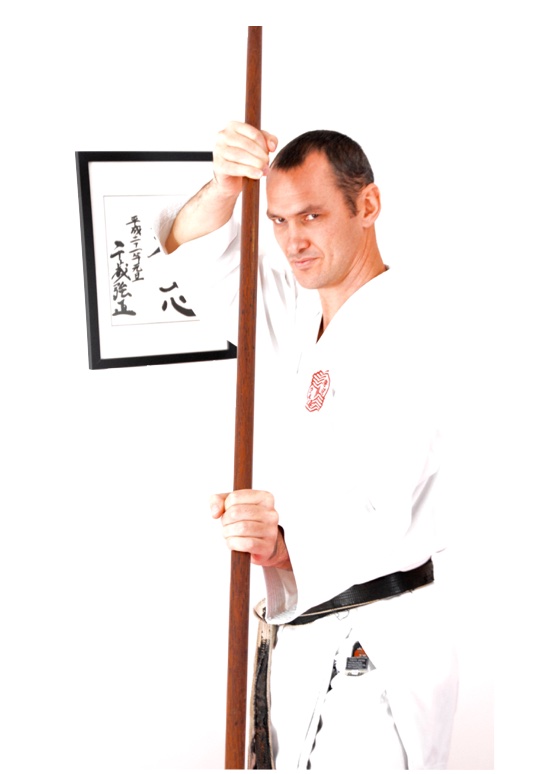Karate is a journey of continuous growth and self-mastery. As practitioners advance to more senior levels, it can sometimes be challenging to see and feel progress. This is where the exploration of weapons training can offer a fresh perspective and deeper understanding of the principles that govern our mind, body, and karate practice. By integrating weapons training into your routine, you can unlock new dimensions of growth and mastery.
Weapons training, or Kobujyutsu, involves the study and practice of traditional Okinawan weapons such as the bo, nunchaku, sai and tonfa. Each weapon has its unique characteristics and requires specific techniques, offering a diverse and enriching experience. The physical and mental demands of weapons training engage the body and mind in ways that differ from empty-hand karate, making it a fascinating and valuable addition to your martial arts repertoire.
As someone relatively new to the study of weapons, I have experienced numerous breakthrough moments that have significantly transferred to my kihon, kata, kumite, bunkai and nage waza training. These moments have been instrumental in learning how to use my body with greater efficiency, timing, and relaxation.
The practice of weapons training requires a heightened level of coordination, balance, and precision. When wielding a weapon, every movement must be deliberate and controlled, fostering a deeper connection between the mind and body.
As Taira Shinken aptly put it, “The use of weapons sharpens both mind and body. It demands a discipline and concentration that is unparalleled in other forms of martial arts.” This connection enhances your overall karate practice by refining your technique and increasing your awareness of how your body moves.
Weapons training is not just about learning how to handle a weapon; it is a means to understand the fundamental principles of karate more deeply. Concepts such as distance, timing, and angles of attack and defense become more pronounced when practicing with weapons.
Fumio Demura emphasizes this point: “Weapons training helps to reveal the underlying principles of karate. The practitioner becomes more attuned to the subtleties of movement and energy.” This deeper understanding translates into more effective techniques and strategies in your empty-hand karate.
As you progress in your karate journey, it is natural to encounter plateaus where growth seems stagnant. Weapons training can serve as a catalyst for breaking through these plateaus.
The novelty and challenge of learning a new weapon can reignite your passion and motivation, providing a fresh perspective on your training. Hirokazu Kanazawa noted, “When you feel like you are not progressing, introducing weapons training can bring new insights and rejuvenate your practice.”
Personally, I have found that integrating weapons training has revitalized my practice. It has helped me break through periods of stagnation and gain new insights into the underlying principles of karate.
Beyond the philosophical and mental benefits, weapons training offers practical advantages. It improves your strength, flexibility, and coordination. The diverse movements involved in handling different weapons enhance your overall physical conditioning, making you a more well-rounded martial artist. Morio Higaonna explained, “The physical benefits of weapons training are immense. It builds strength, enhances flexibility, and improves overall coordination.”
Concentration is a powerful tool that can transform various aspects of our lives. By developing concentration, we can better focus our energies and intentions, leading to more effective and fulfilling outcomes. Weapons training is a beautiful avenue of study to strengthen concentration. Each movement with a weapon requires complete focus and presence, helping you cultivate a deep level of concentration that extends beyond the dojo.
The enhanced concentration developed through weapons training not only improves your martial arts practice but also equips you to use your imagination more effectively to create the life you desire. This focused state of mind allows you to visualise and achieve your goals with greater clarity, determination and sense of peacefulness.
Incorporating weapons training into your karate routine does not require a complete overhaul of your practice. Start by dedicating a small portion of your training time to weapons. Choose one weapon to focus on and gradually build your skills.
Many dojos offer specific weapons classes or seminars, which can provide structured learning and guidance. Shoshin Nagamine advised, “Even a small amount of weapons training can have a significant impact on your karate. Start with one weapon and build from there.”
For those seeking growth and mastery in their karate practice, consider adding weapons training to your routine. The exploration of traditional Okinawan weapons offers a unique and enriching experience that can deepen your understanding of karate principles, enhance your mind-body connection, break through training plateaus and strengthen concentration.
Embrace the challenge and discover new dimensions of your martial arts journey. As Lao Tzu wisely stated, “The journey of a thousand miles begins with a single step. Take that step with weapons training and see where it leads you.”

